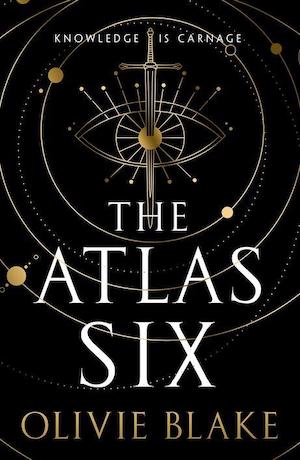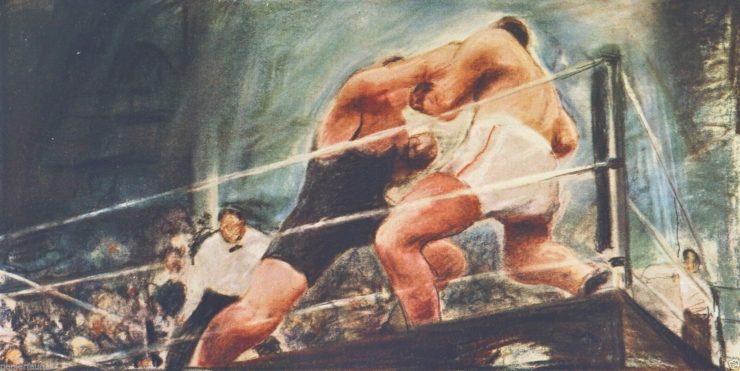It all starts when boy meets girl.
Boy takes girl out for glow-in-the-dark mini-golf and girl underperforms spectacularly. Boy is inadvisably charmed and takes girl back to his place for a little Netflix and chill. Casually, boy turns on the film Lock, Stock, and Two Smoking Barrels and settles in beside girl. From there, the rest is history. It’s love at first sight—
—between the girl and Guy Ritchie’s cinematography, that is.
Because that girl is me, and I’m totally obsessed with fight scenes.
What began as a date that was definitely going nowhere (my apologies to the boy, who now exits our story, pursued by a bear) ended with a lifelong devotion to quippy banter, exuberant profanity, and stylistic fight scenes set to scores that make you want to rob a bank. I’ve never been one for Tarantino, whose cinematic violence is too weapon-heavy for me, and I don’t like gore. What I do like is the dazzle—no, the sparkle—of a good hand-to-hand combat scene. The sense of tactical skill and the surge of adrenaline. The way it looks like a dance. The way that, when it’s done right, you feel a little turned on just for having watched it.
Which is why, when I started writing my own books, I decided it was time to start boxing.
Some say to write what you know, but better advice in my opinion is to know what you write. The moment it became clear to me that I wanted my own fictional works to have some degree of martial arts, I decided it was time to learn firsthand. Four years ago, when my path to publishing was still murky at best, I walked into a boxing class wanting to know everything. How to throw a punch. How to take a punch. And how to make it sound like I’d been doing both for years.
Here is the part of the story where girl meets lots of boys. There are two especially notable ones: Lex, my coach, who coincidentally shares my nickname, and Nacho, my sparring partner, whom some of the people reading this may recognize as the playfully dubbed “Lord Oliver” of The Atlas Six’s dedication page. For those interested in a little behind-the-scenes, Nacho inspired the particular combat style of Nico de Varona, a physicist whose ability to dodge gunshots is rivaled only by the enjoyment he gets out of doing it. While Nico the character already existed prior to my meeting Nacho, I couldn’t resist an homage after watching him fight. (I’ll put it this way: the number one rule in boxing is don’t drop your hands. Keep them up, protect your face. But Nacho? He’s impossibly light on his feet, infamous among the rest of us for his terrifying quickness, and his swagger comes from knowing that nobody’s getting a hand on him. Ever. The first time I watched him drop his glove and laugh, I knew I had found my muse.)
As a rule, I like having answers. So when I don’t know what I’m doing, I look for the most authentic way to find out—which in this case meant training in boxing and Muay Thai for several hours a week, nearly every day, for years. Lex, my coach, taught me when to use certain maneuvers over others and showed me the why in addition to the how. He helped me choreograph several of my scenes, especially those against more proficient opponents. And Nacho, by teaching me which punches were especially hard to slip (a brutal but exhilarating lesson), gave me some of the most critical sensory details I know how to write—like exactly where training should hurt, and how much.
There’s a story Nacho likes to remind me about one of the first times I sparred. We were doing three minute rounds, which sounds like very little, but isn’t. Two minutes in, I’d been getting hit repeatedly in the same spot (my forehead) by my opponent, who was taking advantage of my smaller size and inexperience by keeping me at arm’s length.
After my fourth or fifth time of trying unsuccessfully to work my way into my opponent’s inside range, I finally lost it. (This is how Nacho tells it, anyway.)
“Move your head!” Lex yelled at me from outside the ring. “Move your head!”
“Move it where?!” I demanded, breaking yet another cardinal rule of sparring and rounding angrily on my coach.
“Out of the way!” Lex yelled back, which of course left Nacho cackling on the sidelines while I took yet another punch.
I got better. Eventually, I learned how to work my way into close range and how to make my opponent’s broader wingspan and limited quickness work against him. But also, taking hit after hit taught me something important about resilience, which I sorely needed as my writing “career” (and here, an embittered laugh) continued to sputter and stall. By my third year boxing, I was on my third queried manuscript, and so many self-published books I’d lost track.
There is something about wrapping your battered knuckles for the 39659748th time after reading your 39659748th form rejection that starts to feel a little bit like insanity. You start to wonder if maybe this is all there is, or all there ever will be. And then you start to think things like maybe it would be a lot smarter to give the bruises a rest and give up.
One time, at a night class, I started to cry while wrapping my knuckles. Embarrassing. So many witnesses, all of them boys. By then most of the group was familiar with me and my silly little dreams of writing my silly little stories. Lex, who was profoundly uncomfortable with my tears, gave me one of the most sincere and kind (and profoundly uncomfortable) hugs I’ve ever experienced. Overwhelmed with exhaustion and humiliation, I remember repeating it’s fine, I’m fine, while also thinking I cannot get hit again. I can’t keep doing this. I can’t keep getting on my feet again. Eventually it will hurt too much and I’ll stay down.
Nacho used to ask me, are you famous yet? And I’d say no, not yet, not today. He read The Atlas Six as soon as it came out and started telling everyone we knew (and lots of people we didn’t) to read it. Even after the pandemic shut down our gym, Nacho was diligent. He asked me what new stories I was writing, what new books I was self-publishing, if my querying was going well, if the bone bruise on my knuckle was healing.
Once a week, at least, he would text me: Are you famous yet?
No, I said every time. Rolling my eyes. Not even feeling the impact anymore. No, not yet.
Buy the Book


The Atlas Six
I no longer find it a coincidence that I was unwrapping my knuckles after an especially brutal training session with Lex (this time outside, in a park) when I got an email that other writers will recognize as The Email™ — the one from an agent that says I just finished your manuscript! Do you have time this week for a call? I remember that my shoulders were aching and my lower back was sore. My bone bruise was throbbing and my eyes pricked with tears. I remember the glare off the dash. The heat from the pavement. The way I barely held back a primal scream.
There is a very specific sensation when you slip a punch that you once got caught by, and it feels like you are temporarily superhuman. You feel, firstly, like a genius. For seeing it coming. For reading it correctly. For being right. Then you feel like an athlete, for having the reflexes to move, not too soon or too late, but at the exact right moment. There is a whisper of time when your body seems to react almost independently, like it already knows what to do, because it does. Because for months, maybe years, you have trained for this exact punch—for this exact scenario. Because maybe you can’t see where the round is going, and you can’t guess what other people are going to do—and even if you try, a lot of the time you’ll be wrong—but you take your losses anyway. So that you can be ready when the moment comes. Because when it’s the right moment, you’ll know.
Kind of an obvious metaphor, I know. Sorry to bludgeon you with sentiment, but I started with a romance and I’ll end with one, too.
Lex moved to Montana. Nacho moved to Luxembourg. I got so pregnant I couldn’t see my feet. Sometimes, I look back on the boxing portion of my life like that was the real part and everything that happened after is just a fever dream. It’s not, though. I have the bruises to prove it. And anyway, I’m not putting my gloves away just yet, even though the physical therapist for my pelvic floor calls my postpartum flexibility, quote, atrocious. I am a fighter, and I am a writer.
And this girl never met a fight scene she couldn’t love.
The Atlas Six is available from Tor Books.
Find audio clips and text excerpts from the book here.
Olivie Blake is the pseudonym of Alexene Farol Follmuth, a lover and writer of stories. She has penned several indie SFF projects, including the webtoon Clara and the Devil with illustrator Little Chmura and the BookTok-viral Atlas series. As Alexene, she is the author of the young adult rom-com My Mechanical Romance. She lives in Los Angeles with her husband, new baby, and rescue pit bull.










